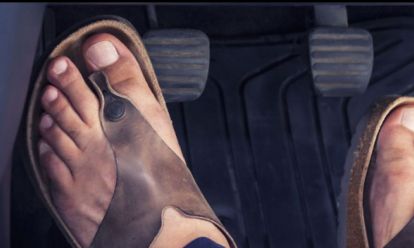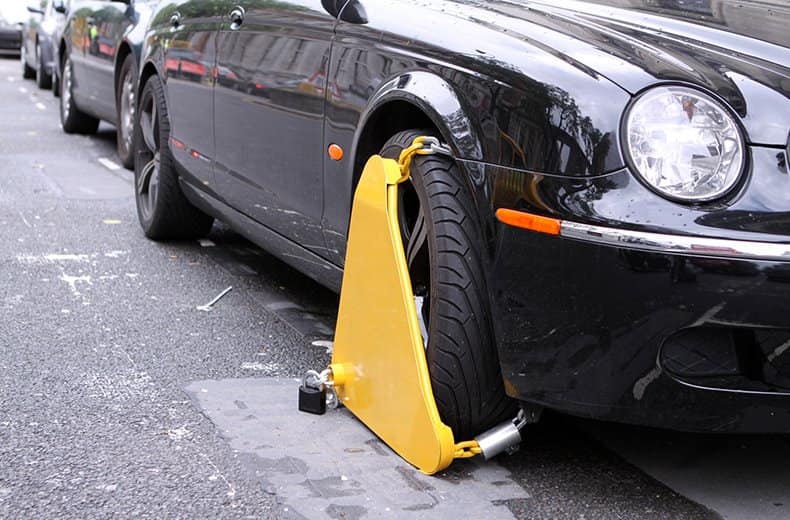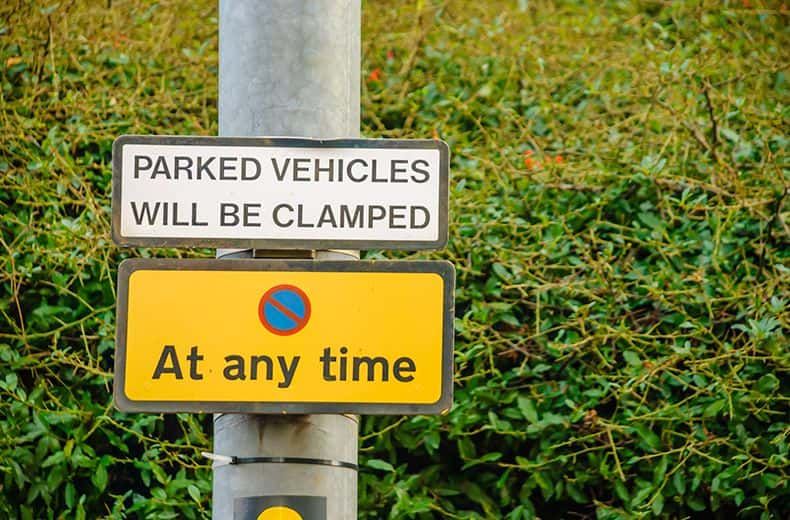How much will getting your car back cost? Is it fair? Can you legally remove a clamp yourself? Read on to find out.
Why has my car been clamped or towed?
Your car can be clamped if:
- it’s parked illegally: police and local councils can clamp cars which are illegally parked on roads and public land, or causing an obstruction – this includes cars that have broken down
- your insurance is invalid: police can clamp any uninsured vehicle
- it’s considered a danger to other road users: the Driver and Vehicle Standards Agency (DVSA) can clamp overloaded or unroadworthy vehicles
- it’s a commercial vehicle and you’ve been driving for too many hours: the DVSA can clamp these vehicles
- it’s a commercial vehicle and you haven’t paid previous fines
Your car can be towed if:
- it’s parked illegally: police and local councils can impound cars which are illegally parked on roads and public land, or causing an obstruction – this includes cars that have broken down
- your insurance is invalid: police can impound any uninsured vehicle
- your vehicle is untaxed: the Driver and Vehicle Licensing Agency (DVLA) can tow or clamp any untaxed vehicle
- you have outstanding debts: or unpaid penalty charge notices (this doesn’t apply in Northern Ireland)
Is it illegal to drive without shoes?
Get the answer and more useful driving content sent straight to your inbox.


Who can legally clamp or tow away my car?
Your car can be legally towed or clamped by:
- police
- local councils
- DVLA
- DVSA
- bailiffs or fines enforcement officers, if the owner has debts to the local council or unpaid penalty charge notices (PCNs)
Of course other road users and organisations (like the RAC!) can tow your vehicle legally, but that’s with your prior knowledge and permission.
Where has my car been towed to?
Your car has most likely been taken to a local impound site. It’s best to call 101 or NSL, which enforces car tax payment, on 0343 224 1999.
If you’re in London, you can text ‘TRACE’ and your vehicle registration to 66663 to quickly confirm if your car has been towed.
What should I do if my car has been clamped?
First call the authority that clamped your car, an INF32 leaflet should have been left on your vehicle. Use the reference number to pay release fees and any applicable parking fines.
If your car has been clamped by the DVLA for unpaid tax, you’ll have to tax the vehicle before paying a £100 release fee. If you choose not to tax the vehicle you will have to pay a £160 surety fee on top of the £100 release fee.
How much is it going to cost to remove a clamp from my car?

Release fees vary across councils and police forces, but it usually costs at least £40 and can be more than £100.
If your car has been clamped by the DVLA for unpaid tax, you’ll have to tax the vehicle before paying a £100 release fee. If you choose not to tax the vehicle you will have to pay a £160 surety fee on top of the £100 release fee.
What should I do if my car has been towed?
First you should find out where your car has been taken, so call the police on 101 or NSL on 0343 224 1999.
When you arrive at the pound you’ll need to pay all relevant fines and bring proof of identity, ownership, insurance and tax.
You are legally required to go the pound within seven working days of the seizure notice. If you don’t reclaim your vehicle within 14 days it can be sold or destroyed.
How does it cost to get my car back?
If your car has been seized by police or a council, you will have to pay a £150 release fee and any outstanding fines. A £20 daily storage fee is also charged by the pound.
If your car has been seized for unpaid tax, you will have to tax the vehicle and pay a £160 surety fee. This fee is refunded if you tax your vehicle within 15 days.
A £100 release fee will also apply if you reclaim your car within 24 hours, rising to £200 after that. There is also a £21 daily storage fee.

Cheaper than AA or we’ll beat by 20%^
• Roadside cover from £5.49 a month*
• We get to most breakdowns in 60 mins or less
• Our patrols fix 4/5 breakdowns on the spot
*At least 10% of new customers pay this for single-vehicle Roadside (Basic). ^Find the same cover cheaper on theaa.com within 7 days & we'll beat it by 20%. T&Cs here.

What documents do I need to get my vehicle back?
You will need the following documents in order to reclaim an impounded vehicle:
- valid photo ID
- valid driving licence
- valid certificate of motor insurance
- proof of ownership
- MOT certificate or evidence of pre-booked MOT appointment
- proof of vehicle tax
Has my car been clamped or towed illegally?
Your car can be clamped or towed if it’s untaxed, uninsured or deemed a danger to other road users. The same applies if your car is parked illegally, is causing an obstruction, or you have debts to the local council or unpaid penalty charge notices.
If you drive a commercial vehicle for too long or have failed to pay previous fines, the DVSA is entitled to clamp your car.
It’s illegal for your car to be clamped, towed, blocked-in or immobilised on private land by a private operator in England, Scotland or Wales. Those who break this law are liable to an unlimited fine in the Crown Court, or up to £5,000 in a Magistrates Court.
What should I do if my car has been clamped or towed illegally?
If you suspect your car has been illegally clamped or towed, take photos (if possible), clearly showing where it is (or was) parked and include any parking enforcement signs in the area.
Collect these and any other relevant documents e.g. proof of vehicle tax and contact the creditor, person or company you owe money to. If they won’t remove the clamp you should contact your local Citizens Advice service.
All RAC members are entitled to free legal advice and support through our 24/7 Legal Helpline. Call our qualified Legal Advisors on 0330 159 1446.
Can I legally remove a clamp?
You can remove a clamp if it was illegally fixed to your car and you have already given the bailiff an opportunity to remove it.
But before you break out the angle grinder... All RAC members are entitled to free legal advice and support through our 24/7 Legal Helpline. So call our qualified Legal Advisors on 0330 159 1446 first!
Does my car being clamped or towed affect my insurance?
Whether your clamped or towed car affects your insurance is down to your provider. Check your policy or contact them directly.






